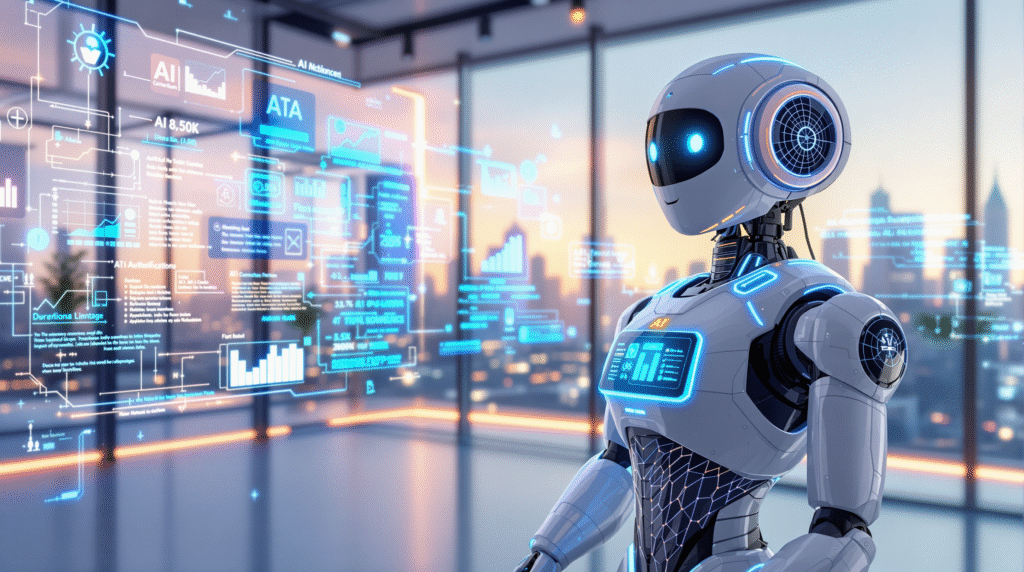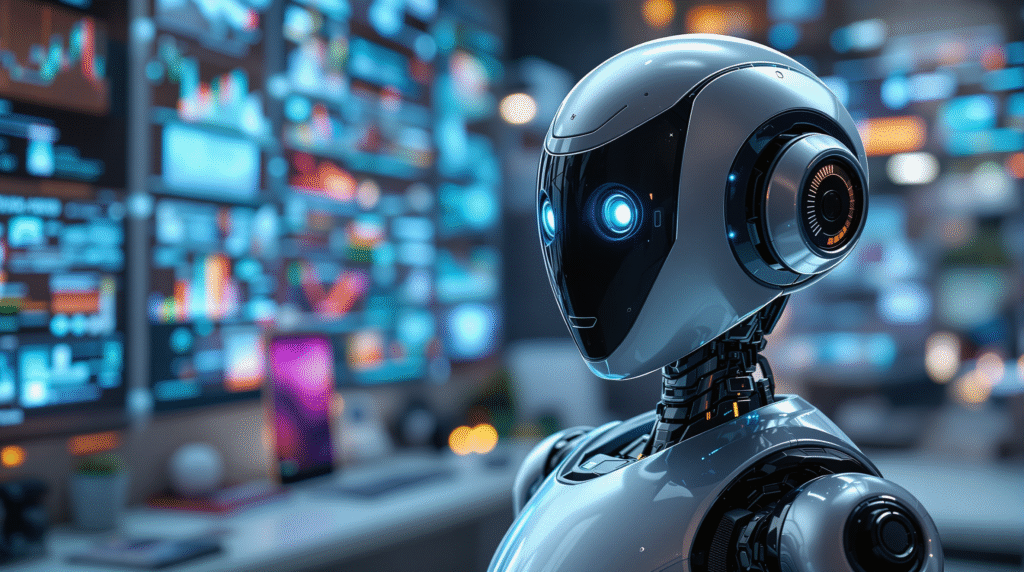Introduction: Why is it worth learning about AI Agents?
IArtificial intelligence (AI) is increasingly present in our daily lives—from voice assistants in smartphones, through movie recommendations on streaming platforms, to smart home management systems. One of the key concepts in the world of AI is so-called AI agents. Understanding what AI agents are and how they work is the first step to getting to know modern technologies that are changing the way we work, learn, and communicate. This knowledge is useful not only for those interested in programming but for anyone who wants to consciously use new technological solutions.
Definition of an AI Agent – What is it exactly?
An AI agent is a computer program or system that can independently make decisions and perform tasks in a specific environment. Simply put, an AI agent is a „virtual assistant” that observes its surroundings, analyzes available information, and chooses the best possible actions to achieve a set goal.
In technical literature, an agent is defined as an „entity” that receives stimuli from its environment (e.g., data, signals, commands), processes them according to specific rules or algorithms, and then takes actions aimed at completing a task. Examples of AI agents include chatbots answering user questions, autonomous cars analyzing road situations, or programs recommending products in online stores.
It is important to note that an AI agent does not have to be very advanced—even simple programs that react to specific events can be considered agents. The key is that the agent acts autonomously, making decisions based on received data.
Example of a simple AI agent in Python
To better understand how an AI agent works, let’s look at a simple example in Python. Let’s create an agent that observes the temperature and decides whether to turn on the heating:
python
Copy Code
class HeatingAgent:
def __init__(self, threshold_temp):
self.threshold_temp = threshold_temp
def observe_and_act(self, current_temp):
if current_temp < self.threshold_temp:
return „Turn on heating”
else:
return „Heating off”
# Example usage
agent = HeatingAgent(threshold_temp=20)
print(agent.observe_and_act(current_temp=18)) # Turn on heating
print(agent.observe_and_act(current_temp=22)) # Heating off
How does an AI Agent work?
To understand how an AI agent works, it’s worth looking at its basic elements and decision-making process. Every AI agent operates according to the scheme: observation – analysis – action. First, the agent gathers information about its environment, then analyzes this data, and finally takes appropriate actions to get closer to its goal.
In practice, an AI agent can use various data sources, such as sensors, databases, user interactions, or the internet. Based on the collected information, the agent applies specific rules, algorithms, or machine learning models to choose the best possible response or action.
For example, an AI agent in the form of a chatbot first analyzes the content of the user’s question, then searches for the appropriate information in a knowledge base, and finally generates a response. In the case of an autonomous car, the agent analyzes data from cameras and sensors, assesses the road situation, and makes decisions such as accelerating, braking, or turning.
AI Agent operation scheme
Perception – the agent receives data from the environment (e.g., temperature, image, text).
Analysis – the agent processes the data, recognizes the situation, and evaluates possible options.
Decision – the agent chooses the best action based on the analysis.
Action – the agent performs the selected activity (e.g., answers a question, controls a device).
Example: Agent deciding whether to turn on the light
Below is a simple example of an AI agent in Python that decides whether to turn on the light based on the brightness level in a room:
python
Copy Code
class LightAgent:
def __init__(self, brightness_threshold):
self.brightness_threshold = brightness_threshold
def observe_and_act(self, current_brightness):
if current_brightness < self.brightness_threshold:
return „Turn on the light”
else:
return „Light off”
# Example usage
agent = LightAgent(brightness_threshold=50)
print(agent.observe_and_act(current_brightness=30)) # Turn on the light
Key Features of AI Agents
print(agent.observe_and_act(current_brightness=70)) # Light off
AI agents can be very diverse, but they share several key features that distinguish them from ordinary computer programs.
Autonomy – an AI agent operates independently, without constant human intervention. It can make decisions based on its own observations and data analysis.
Reactivity – the agent can react to changes in its environment. This means it does not operate according to a rigid scenario but adapts its actions to the current situation.
Goal-oriented – every AI agent has a specific goal or task to accomplish. This could be, for example, maintaining the right temperature in a room, answering user questions, or optimizing a travel route.
Ability to learn – more advanced AI agents can learn from experience. As a result, they become more effective in performing their tasks over time.
Communication – some AI agents can communicate with other agents or users, exchanging information and collaborating to achieve a common goal.
In summary, an AI agent is not just a program executing commands, but an intelligent system that can independently observe, analyze, and act to achieve a set goal. Thanks to these features, AI agents are finding increasingly broad applications in various areas of life and business.
Examples of AI Agents in Everyday Life
AI agents are increasingly present in our daily lives, often without us even realizing it. Their task is to make our lives easier, automate repetitive activities, and support decision-making. Here are some examples of AI agents you may encounter every day:
Voice assistants such as Siri, Google Assistant, or Alexa are among the most recognizable AI agents. They can understand voice commands, answer questions, set reminders, or control smart homes. Another example is chatbots available on websites and in apps, which help customers solve problems, provide product information, or support the purchasing process.
In online stores, AI agents analyze your previous purchases and viewed products to offer personalized recommendations. In cars, we increasingly encounter driver assistance systems that analyze the vehicle’s surroundings and help avoid collisions, or can even park autonomously.
At home, smart thermostats like Google Nest learn your temperature preferences and automatically adjust heating or air conditioning settings. Even spam filters in email inboxes are AI agents that analyze message content and decide which should go to the „Spam” folder.
As you can see, AI agents are already present in many aspects of our lives, often working in the background and making everyday activities simpler and more comfortable.
Types of AI Agents
AI agents can differ in their level of advancement, mode of operation, and degree of autonomy. Here are several basic types of AI agents worth knowing:
Simple (reactive) agents – the simplest type of agents, which react to current stimuli from the environment, without memory or learning ability. An example is an agent deciding to turn on the light based on the current brightness level.
Agents with limited memory – can remember some information from the past, allowing them to make more complex decisions. An example is an autonomous car that remembers the last position of obstacles on the road.
Learning (intelligent) agents – use machine learning algorithms to improve their performance based on experience. Examples include recommendation systems that analyze your choices and increasingly better match suggestions.
Multi-agent systems – systems consisting of many agents that cooperate, exchange information, and jointly accomplish tasks. Examples include robots collaborating in warehouses or urban traffic management systems.
Hybrid agents – combine features of different types of agents, e.g., can both react to current stimuli and learn from experience.
Each of these types of AI agents is used in different fields and solves different problems. The choice of the appropriate type of agent depends on the specific task and requirements regarding autonomy, flexibility, and learning ability.
What Tasks Can AI Agents Perform?
AI agents are extremely versatile and can perform a wide range of tasks, both simple and very complex. Their application depends on the user’s needs and the environment in which they operate. Here are some examples of typical tasks that AI agents can perform:
In customer service, AI agents such as chatbots answer user questions, help solve technical problems, and support the purchasing process. In finance, AI agents analyze transactions, detect suspicious operations, and help manage investment portfolios. In logistics and transport, AI agents optimize delivery routes, manage vehicle fleets, and predict delays.
In medicine, AI agents support diagnostics by analyzing test results and suggesting possible diagnoses. In smart homes, AI agents control lighting, heating, or security systems, adjusting settings to residents’ preferences. In education, AI agents personalize learning materials, monitor student progress, and propose individual learning paths.
It’s also worth noting that AI agents can perform creative tasks, such as generating texts, music, or images, and support business decision-making by analyzing large data sets and indicating the best strategies.
Example: AI Agent for Automatically Replying to Emails
Below is a simple example of an AI agent in Python that analyzes the subject of an email and automatically generates a response:
python
Copy Code
class EmailAgent:
def reply(self, subject):
if "meeting" in subject.lower():
return "Thank you for the meeting invitation. I confirm my attendance."
elif "offer" in subject.lower():
return "Thank you for sending the offer. I will review it soon."
else:
return "Thank you for your message. I will reply as soon as possible."
# Example usage
agent = EmailAgent()
print(agent.reply("Meeting invitation")) # Thank you for the meeting invitation. I confirm my attendance.
print(agent.reply("New cooperation offer")) # Thank you for sending the offer. I will review it soon.
print(agent.reply("Technical question")) # Thank you for your message. I will reply as soon as possible.Differences Between an AI Agent and a Traditional Program
Although AI agents and traditional computer programs may seem similar at first glance, there are significant differences between them that affect how they operate and their range of applications.
First of all, an AI agent operates autonomously—it independently observes its environment, analyzes data, and makes decisions, often without direct human intervention. A traditional computer program executes strictly defined instructions written by a programmer and cannot independently adapt to changing conditions.
Another difference is the ability to learn. AI agents, especially those using machine learning, can analyze their previous actions and improve their decisions in the future. Traditional programs do not have this feature—their behavior is always the same until manually modified.
AI agents are also more flexible and can react to unforeseen situations. Thanks to this, they can be used in dynamic environments where conditions often change, such as in autonomous vehicles or energy management systems. In summary, an AI agent is an intelligent system that can independently observe, analyze, and act, learning from experience. A traditional computer program, on the other hand, is a set of rigid instructions that do not change over time and do not adapt to new situations
How to Start Working with AI Agents?
Starting your journey with AI agents doesn’t have to be difficult, even if you’re just beginning to learn programming or artificial intelligence. The most important thing is to understand the basic concepts and try to create your own simple agent. Here are a few steps to help you get started:
First, it’s worth choosing a programming language that is popular in the AI world—Python is most often recommended. It’s easy to learn and offers many libraries and tools that support building AI agents, such as scikit-learn, TensorFlow, or PyTorch.
The next step is to learn the basics of programming and the principles of how agents work. It’s a good idea to start with simple projects, such as an agent that decides whether to turn on the light or answers simple questions. This will help you understand the observe–analyze–act cycle.
Once you feel more confident, you can try more advanced projects, like creating a chatbot, a simple recommendation system, or an agent that learns from data. There are many online courses, tutorials, and ready-made code examples that will help you develop your skills.
Experimenting and testing different solutions is also important. Creating AI agents is a creative process where you can invent new applications and improve your projects.
Example: Creating a Simple AI Agent in Python
Below is an example of a very simple agent that recognizes whether a user is logged in and takes the appropriate action:
python
Copy Code
class LoginAgent:
def check_status(self, logged_in):
if logged_in:
return "Welcome back!"
else:
return "Please log in."
# Example usage
agent = LoginAgent()
print(agent.check_status(True)) # Welcome back!
print(agent.check_status(False)) # Please log in.Summary and Next Steps
AI agents are a fascinating area of artificial intelligence that already impacts many aspects of our lives. Thanks to them, it’s possible to automate everyday tasks, personalize services, and solve complex problems in business, medicine, or education.
In this article, we explained what AI agents are, how they work, what features they have, and where you can encounter them. You also learned about different types of agents and examples of their applications. We showed you how to start your own adventure with creating AI agents, even if you are a beginner.
If you want to develop in this field, it’s worth continuing to learn programming, exploring new tools and libraries, and experimenting with your own projects. You can also join AI developer communities, participate in online courses, and follow the latest trends in this area.
Remember, the world of AI agents is very dynamic and full of opportunities—just a bit of curiosity and willingness to learn is enough to start creating your own intelligent solutions!
Agents AI: A New Era of Automation and Intelligent Decision-Making in Business
AI Agent Lifecycle Management: From Deployment to Self-Healing and Online Updates
Advanced Deep Learning Techniques: From Transformers to Generative Models


